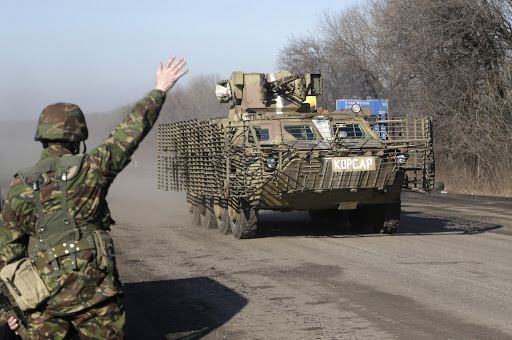(Vatican Radio) — The United States and the European Union have expressed caution about a new Ukraine peace agreement reached during talks Thursday. The accord includes a ceasefire starting Sunday, followed by the withdrawal of weapons, the establishment of a demilitarized zone and the exchange of prisoners.
But fierce fighting surged Friday in eastern Ukraine as Russian-backed separatists mounted a major, sustained offensive to capture a strategic railway hub ahead of the cease-fire. At least 25 people were killed across the region, officials reported.
Clashes appeared only to have increased since the peace agreement was sealed Thursday in the Belarusian capital of Minsk by the leaders of Russia, Ukraine, Germany and France. German Chancellor Angela Merkel cautiously described the cease-fire that takes effect early Sunday deal as "a glimmer of hope."
Washington and Brussels have made clear that a ceasefire must be respected before any scaling back of sanctions against Russia can be considered. President Barack Obama’s administration said the Ukraine peace deal that was reached after 16 hours of negotiations may give too much to Russia and the pro-Russian rebels.
The White House just called it a "potentially significant step," and Secretary of State John Kerry said there is still a long road ahead before achieving peace and the full restoration of Ukraine sovereignty.
But American officials said any action on lethal aid to Ukraine or new sanctions against Russia is on hold, at least for the moment, while keeping current measures in place.
European Union leaders expressed caution as well. During a summit in Brussels, French President Francois Hollande said it was "important to keep up the pressure," while EU President Donald Tusk concluded that the "trust in the good will of Russian President Vladimir Putin is limited."
That skepticism is shared by Ukraine’s President Petro Poroshenko. "It were very difficult negotiations and we expect a very difficult implementation process," he said.
"Ukraine has always been very responsible in the implementation of the Minsk agreement, unlike the other sides. That is also why I arrived in Brussels to coordinate our next steps with the European Union partners."
But in the rebel stronghold of Donetsk, supporters of the leadership expressed concern during an anti-war rally.
Tatjana Demchenko, a representative of the separatist community in Donetsk remains doubtful.
"I simply don’t believe Poroshenko; he is not the kind of person you can trust," she said. Another woman agreed, saying, "We will see if there will be a ceasefire or not. History shows, and you saw it with your own eyes, the kind of ceasefires we have had."
Dozens of people have died in recent days on all sides.
The EU has a Monday deadline to decide whether to impose travel restrictions and asset freezes on 19 more Russians and separatists as well as nine entities, pending the situation on the ground.
Moscow denies Western claims that it supports the rebels with weapons and troops, though the Kremlin admits Russian volunteers are in the area.
Ukraine also received a financial boost: The International community agreed to give it a new bailout deal with $17.5 billion, and that could climb to around $40 billion with lenders such a Europe, the United States and the World Bank.
Moscow vehemently denies that it provides manpower and weapons to the rebel forces, but the sheer quantity of powerful weapons at the separatists’ disposal has strained that position.
The next step after the cease-fire is to form a sizeable buffer zone between Ukrainian forces and Russia-backed rebels. Each side is to pull heavy weaponry back from the front line, creating a zone roughly 30-85 miles (50-140 kilometers) wide, depending on the caliber of the weapons. The withdrawals are to begin starting Monday and be completed in two weeks.
Other thorny political questions, including a degree of autonomy for the disputed eastern regions, are to be settled by the end of the year.
The Associated Press contributed to this report.

